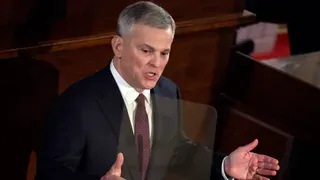April 2, 2015
Governor in a Political Firestorm Over Indiana Law
Jason St. Amand READ TIME: 3 MIN.
Just a week ago, Indiana Gov. Mike Pence was considered one of the few Republican presidential prospects who could unite the GOP's business wing with religious conservatives.
Today, his standing with both groups is threatened as the national backlash intensifies over his state's law on religious freedom.
Pence spent much of Wednesday behind closed doors to pursue "a fix" to legislation he signed six days earlier. Business leaders have been among the most aggressive critics of the law, which was cheered by the GOP's evangelical wing as a needed protection for business owners should they refuse services to same-sex couples on religious grounds.
Pence, lesser known than some Republican White House prospects, has become the central figure in the contentious debate, offering him both opportunities and risks just as the 2016 presidential primary season begins and he decides whether to run. Yet so far, the debate is deepening the very divisions within his party that he hoped to bridge.
"Pence was the guy who theoretically could bring the business community together with the evangelical community, but now they are at each other's throats," said veteran Republican strategist John Feehery. "This whole thing has been a complete disaster."
The backlash in Indiana has quickly spread to other states where Republicans hoped to enact similar laws.
In Arkansas, Gov. Asa Hutchinson on Wednesday called for changes to similar legislation that has been sent to his desk, saying it wasn't intended to sanction discrimination based on sexual orientation. The governor noted that his son was among those who signed a petition asking him to veto the initial proposal.
"This is a bill that in ordinary times would not be controversial, but these are not ordinary times," Hutchinson said.
Similar measures in North Carolina and Georgia are also facing new scrutiny as a result of the Indiana fallout.
Last week, Pence signed the state Religious Freedom Restoration Act, giving heightened protections when businesses or individuals object on religious grounds to providing certain services.
Critics of the law say the intent is to discriminate against gays. They fear, for example, that caterers, florists, photographers and bakers with religious objections to same-sex marriage will be allowed to refuse to do business with gay couples. Supporters of the law say it will only give religious objectors a chance to bring their case before a judge.
Caught off guard by the intensity of the criticism, Pence on Tuesday called on state lawmakers to amend the Indiana law by the end of the week to clarify that it does not discriminate against gays.
Conservative bloggers and religious conservatives across the country who last week praised Pence's leadership on the issue lashed out at the governor for bowing to pressure.
Pence, a former congressman, has long been popular among evangelical voters, although he has largely focused on economic issues since winning election to his first term in 2012. He's pushed tax cuts for businesses, promoted expansions of voucher programs and charter schools, and emphasized job growth and the budget surplus.
Pence stayed on the sidelines in 2014 as a proposed state constitutional amendment to ban gay marriage failed in the Republican-dominated Legislature. Federal courts later legalized gay marriage in the state.
His focus on the economy did not help him in this week's debate, however.
Leading companies such as Wal-Mart, Apple, Gap and Levi Strauss spoke out against the religious-objections legislation, and a group of technology executives from companies such as Yelp and Twitter called for the addition of non-discrimination protections for lesbian, gay, bisexual and transgender people to civil rights laws.
The business website Angie's List, led by a prominent Republican donor, was among nine Indiana-based companies "deeply concerned about the impact it is having on our employees and on the reputation of our state," according to a letter to Pence this week.
Pence's strongest support came from the class of Republican presidential prospects. Former Florida Gov. Jeb Bush, Texas Sen. Ted Cruz, Florida Sen. Marco Rubio and former Texas Gov. Rick Perry defended Pence and the Indiana law in recent days.
New Jersey Gov. Chris Christie, another prospective presidential candidate, said he's certain that Pence will take the correct action.
"We should not have a situation where people perceive that anybody will be denied service," Christie told The Wall Street Journal. "But, I can tell you this: I know Mike Pence, and he's got nothing but love in his heart for people, and I just do not believe that in any way Mike Pence would intend for anything that happen in his state on his watch to be discriminatory towards any person."
Leading Republican donor Fred Malek said Pence earned the respect of business leaders and conservatives alike throughout his year in public office. "I think he's being unfairly criticized," Malek said. "He's doing the right thing."







